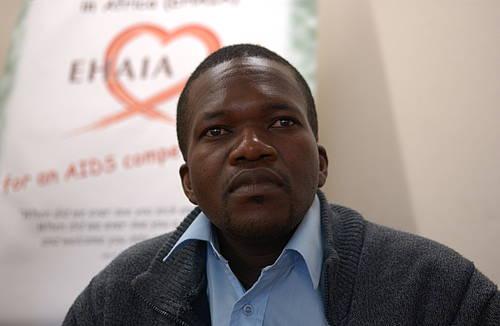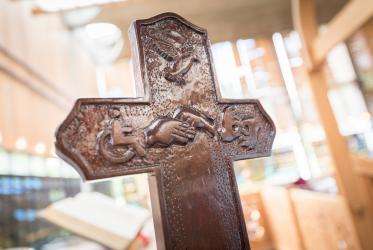By Walt Wiltschek (*)
Dr Ezra Chitando grew up in Zimbabwe surrounded by the devastating reality of HIV/AIDS, losing many friends and relatives to the disease.
Years later, he is trying to change the future for others: by training clergy throughout Africa about the role of the church with HIV and AIDS, and by calling on the wealthier churches of North America and Europe to share resources in fighting AIDS. He has also authored two books on AIDS just released from the WCC.
Working with the Ecumenical HIV and AIDS Initiative in Africa (EHAIA) - a programme of the World Council of Churches (WCC) - Chitando travels to theological schools across the continent urging faculty, administrators, and others to integrate education about the HIV/AIDS pandemic into the schools' curricula.
The work grew out of a 2001 Global Consultation on the Ecumenical Response to the Challenge of HIV/AIDS in Africa, whose sponsors included the WCC. A plan of action from that event stated, "As the pandemic has unfolded, it has exposed fault lines that reach to the heart of our theology, our ethics, our liturgy and our practice of ministry". It noted the churches' "difficulty in addressing issues of sex and sexuality".
Chitando, then on the faculty of the University of Zimbabwe, became involved in the work via one of the outcomes of that consultation: a WCC-sponsored training programme on HIV/AIDS and theology. It was part of a "global effort to stimulate theological and ethical reflection, dialogue, and exchange on issues related to HIV/AIDS".
He attended a training of trainers seminar led by Musa Dube of Botswana in 2002 and knew he had found his calling. "That triggered my interest to realize I could indeed contribute", Chitando says. "I began to see the possibilities".
As he and others working with EHAIA studied the training of clergy, they found that most of them were "ill-prepared" for the actual ministry contexts that lay ahead. "They were trained in everything but the real issues they will face", Chitando says. "That's what we are trying to mitigate".
Chitando carries out his work in English-speaking areas of Africa, travelling widely and often. Others work in the theological schools of French- and Portuguese-speaking regions. The organisation also has regional coordinators who work directly with churches and their ministries.
While he wants African churches to become much more involved, he stresses that the pandemic requires the involvement of the entire global community.
On one hand, he says the "historically more privileged" churches of the North need to share resources in the ongoing struggle - both material and financial. It is especially pressing as inflation soars in parts of Africa, most notably Zimbabwe.
"These are issues of poverty - practical issues", he says. "That's where the church steps up its advocacy role and says we cannot allow people to die because they are poor".
On the other hand, Chitando says the Northern Hemisphere churches have the opportunity to "very humbly sit at the feet of the Africans who have travelled down this road and achieved so much", to share and learn from their experiences. He also hopes that the theological institutions of the North will make teaching on HIV/AIDS part of the education of their students.
"We can't be silent on the HIV/AIDS epidemic", Chitando says. "We can't do contemporary education without engaging with the HIV epidemic".
And Chitando has taken further steps himself. His two new books - Living with Hope and Acting in Hope - were launched 18 February during the WCC central committee meetings in Geneva. Both are part of the WCC's "Risk Series".
"We need to keep the momentum up. There is so much more that needs to be covered", he says of his writing. "It's a journey. We're all learning still how to deal with the HIV/AIDS epidemic".
(*) Walt Wiltschek is an ordained minister in the Church of the Brethren (US) and editor of its denominational magazine, Messenger. He lives in St. Charles, Illinois, in the United States
More information on the Ecumencial HIV and AIDS Initative in Africa (EHAIA) on the WCC website
More information on the 13-20 February 2008 central committee meeting








